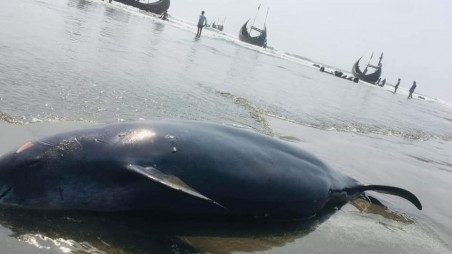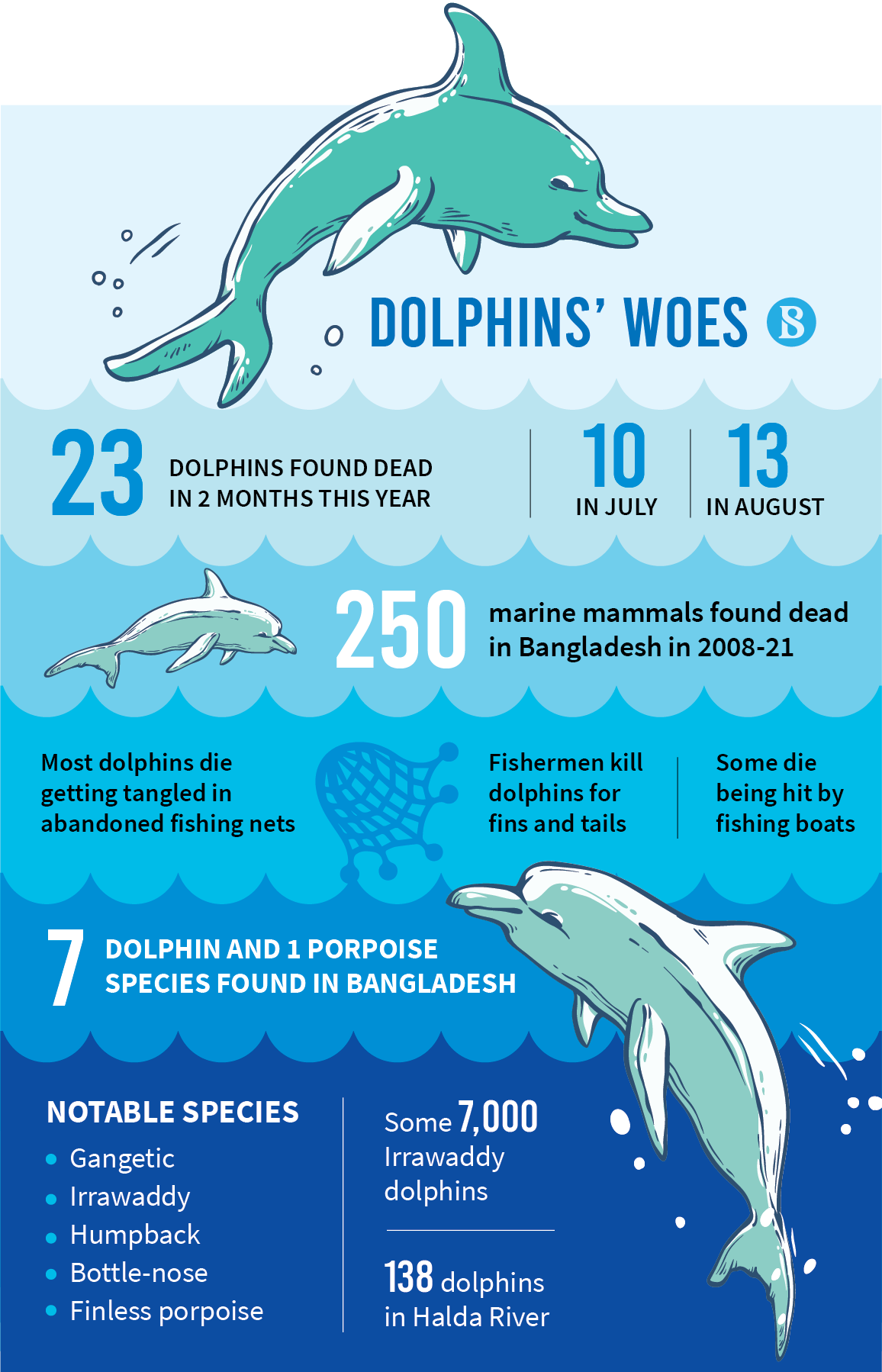The death traps of abandoned fishing nets
According to Wildlife Conservation Society, fishing nets are responsible for 65% of the deaths of whales and dolphins on our shores

The Halda River Research Laboratory of Chattogram University recovered the body of a dolphin trapped in a fishing net from the River Karnaphuli on 1 August. An autopsy concluded that the dolphin died of suffocation as its mouth was entangled in the net underwater.
In August, several dead dolphins were found entangled in nets at Kuakata in Patuakhali too. Across the country, 13 dead dolphins were found in August and 10 in July – all of them died entangled in fishing nets abandoned by fishermen.
Researchers say fishermen abandon a large number of fishing nets in the sea and rivers out of negligence, which have become death traps for dolphins. These "ghost nets" also kill a significant number of other marine animals including sharks, sea turtles, whales, crabs, and seabirds.
According to the Wildlife Conservation Society (WCS), 2,50 marine mammals – most of them dolphins – have been found dead in Bangladesh's waters since 2008.
The researchers say these ghost nets are a global problem, but in recent times the problem has become apparent in the Bay of Bengal, and the country's rivers.
WCS Country Representative Dr Muhammad Zahangir Alom said, "The number of dolphins is higher than other animals that die in the sea because of abandoned fishing nets. These nets are responsible for 65% of the deaths of whales and dolphins on our shores. Fishing boats also often kill dolphins."
The World Fish Centre is working on dolphins with their Ecofish Project in Kuakata. Professor Abdul Wahab of Bangladesh Agricultural University, who is leading the project, said, "Members of law enforcement agencies also cut illegal nets during their operations and leave them in the sea or rivers. Within a few days, algae grow on these nets and become habitats for small fish and snails. Abuja dolphins try to eat them and thus get entangled in the nets."
Sagarika Smriti, assistant researcher at the Ecofish Project, told The Business Standard, "We only get information about a very small number of dolphins dying in the sea. If the data on only 10 kilometres of the 710-kilometre coast is so alarming, it makes us wonder what the situation might be on the entire coast. There is a need for government action to stop these killings."
The government departments responsible do not have any exact information on why so many dolphins are dying in the sea every year. The Department of Livestock Services, the Department of Fisheries, and the Forest Department accuse each other of not taking any action in this regard.
In 2012, the Forest Department was given the responsibility of protecting dolphins under the Wildlife Conservation Act. But activities are very limited in this regard although there is a project called the EPASIIAE Project (Dolphin Project).
Imran Ahmed, director of the Sheikh Kamal Wildlife Center under the Forest Department, told The Business Standard, "Although we work on wildlife, we do not have anything to do with dolphins."
Dr Muhammad Zahangir Alom said, "It is sad to say that we may never know the actual number of dolphins dying on the vast coast of the Bay of Bengal and in the rivers of the country. Because no organisation in the country is keeping a full account of the death of dolphins. The government departments have not taken any step in this regard."
Fishermen kill dolphins to smuggle fins and tails
Some fishermen go to the sea and hunt dolphins to collect their fins and tails as they are used to make medicine. After cutting the fins and tails they throw the body of the dolphins into the sea.
Save the Nature of Bangladesh, an environmental organisation working on biodiversity along the Cox's Bazar coast, said that from September 2019 to August 2020, bodies of 25 dolphins were found in Cox's Bazar beach, Teknaf, Ukhia, Matarbari, Kutubdia, and various parts of St Martin's beach. Most of them had bruises on their bodies.

ANM Moazzem Hossain, chairman of Save the Nature Bangladesh, said, "Last year, the bodies of 27 dolphins were found in Cox's Bazar. All of them had bruises on their bodies. They were beaten to death by fishermen after being caught in the net."
Professor Abdul Wahab said, "Greedy fishermen kill dolphins for fins and tails as they are valuable in producing medicine. They are also valuable as food. Most of the dead dolphins that I have seen so far were without fins and tails."
Abu Saeed Muhammad Sharif, senior scientific officer, Department of Biological Oceanography at the Bangladesh Oceanographic Research Institute, said, "Dolphins are mammals. Our Sonadia coast and the Swatch of No Ground area have long been a place for dolphins to roam. Since they survive with oxygen in the air, they roam the surface of the water. Because of this, they are more likely to be trapped on fishing nets and it is difficult to save the dolphins if they are trapped."
However, fishermen claim that they do not kill dolphins on purpose.
Saleh Ahmed has been fishing in Chattogram, Cox's Bazar, and St Martin's coasts for the last 20 years.
"We do not kill even an ant on purpose. But many dolphins die from being hit by our fishing boats at sea or by being caught in nets. When dolphins get caught in the net, they often have to be killed," he told The Business Standard.
Gangetic dolphin on the verge of extinction
According to the WCS, there are seven species of dolphins and only one species of porpoise in Bangladesh. Notable among them are Gangetic, Irrawaddy, Humpback, and Bottle-Nose dolphins and Finless porpoises. Of these, the only real freshwater dolphin is the Gangetic dolphin. All the other dolphins are saltwater species from the sea.
Irrawaddy is another species of dolphin found in the Sundarbans and coastal saltwater rivers. It is estimated that there are about 7,000 Irrawaddy dolphins in the country.
The country's only natural fish breeding ground, the Halda River, is home to the endangered Gangetic dolphins. But due to man-made catastrophes and salinity, this species of dolphins is on the verge of extinction.
Not just in the Halda River, Gangetic dolphins are an endangered species in most of the rivers of South Asia. The IUCN listed the species as endangered in the Red Category in 2012.
According to the Halda River Research Laboratory of Chattogram University, 167 dolphins were found in Halda in 2018, but now the number is 138.
Dr Md Manzoorul Kibria, coordinator of Halda River Research Laboratory, said, "Gangetic dolphins are found only in Halda and Karnafuli rivers after the Ganges river in India. These dolphins have had their characteristics from the environment for hundreds of years. In the last four years since September 2017, 29 dolphins have died in the river.
"Gangetic dolphins are freshwater creatures. As salinity increases in river water, dolphins will lose their habitat and move upstream. At the same time, there is a fear that it will become extinct completely."
What is the solution?
Dr Md Manzoorul Kibria said that in a study conducted from the Ganges River to the Bay of Bengal, Professor Dr Sarah Nelms of Exeter University found that endangered dolphins and turtles in rivers and seas are at risk of being caught in abandoned fishing nets.
"They are also dying after being trapped in plastic waste. Which is pushing this rare marine mammal of the world to the brink of extinction," he said.
As part of the National Geographic Society's "Sea to Source: Ganges" campaign, an international team surveyed fishing waste in the Ganges River and found a solution to the problem with ghost nets.
Dr Md Manzoorul Kibria said, "All the abandoned fishing nets found in the sea and rivers can be used to make valuable carpets and garments. Recycling of torn nets has a strong potential as a solution to the problem."
He said, "A similar project to clean up fishing waste in the Philippines has been successful. There it became a unique social enterprise."
Patuakhali District Fisheries Officer Mollah Emdadullah said an investigation committee was formed in July 2020 after eight dead dolphins were found floating on Kuakata beach.
The committee continued its investigation and found five causes of dolphin deaths including abandoned fishing nets and trawler fans. The committee recommended training fishermen to release dolphins from the nets.
On the other hand, the autopsy report of the dead dolphin found in Halda River in 2018 recommended six points including banning the use of gear nets in rivers, raising awareness about dolphins, reforming existing fisheries laws to protect aquatic animals, and protecting environmentally sensitive animals from industrial waste and contaminated water.



 Keep updated, follow The Business Standard's Google news channel
Keep updated, follow The Business Standard's Google news channel
















